LOST 033 - Ben, There? Done That
Unpacking the TV show LOST — Season 3: Episode 20.
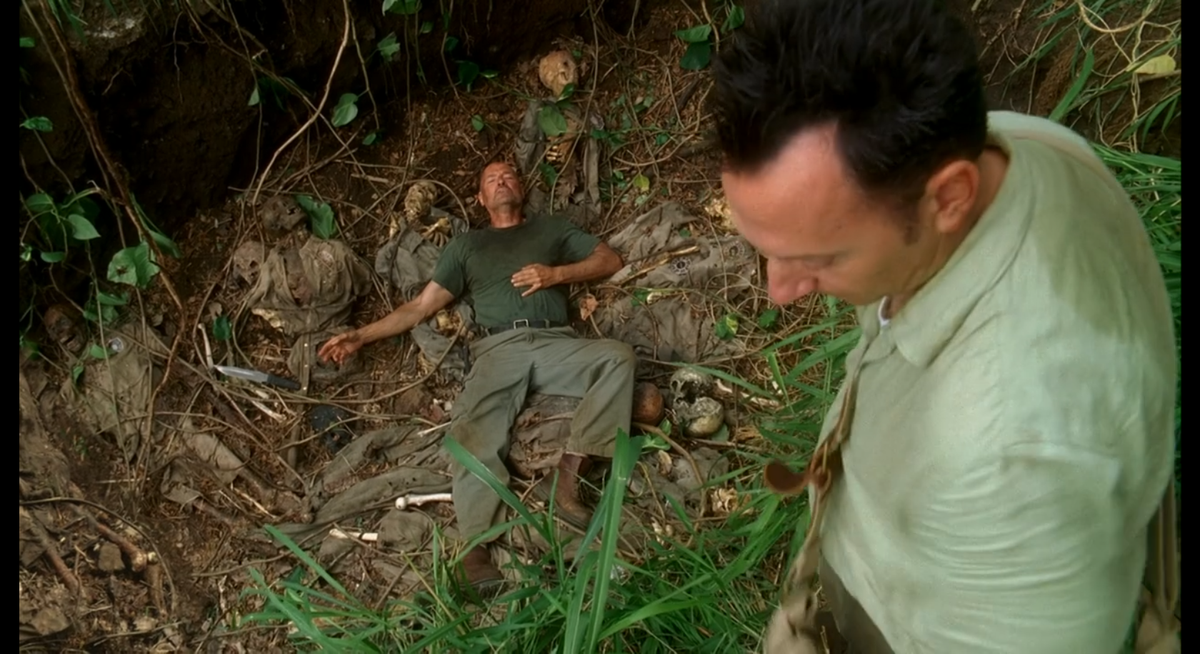
A bunch of people joined The Reframe this month, so to the hundreds of readers that might not know that every once in a while I drop a mega-post on the TV show LOST ... uh, I do that sometimes. They're always chock full of spoilers, so to anybody who hasn't yet watched a TV show that wrapped 15 years ago: Beware, now you know. For those of you who aren't into LOST, I recommend you delete this entry and allow your mind to once again become as limpid and untroubled as a forest pool. For those of you who are super into LOST deep-dives, you might start your journey right here at the start of the series and catch back up with the rest of us.
And now, brethren and sistren and nonbinaryren of The Reframe: Let us LOST.
Previously, on LOST: Oceanic Flight 815 crashed onto an island, a bunch of people survived, there are mysteries within mysteries, and flashbacks upon secrets upon lies, but the most relevant things to know for today's entry is that I call the survivors the Oceanics, and they have a leader named Jack Shephard, who is a surgeon and also has a bit of a martyr complex, and also the Oceanics have another leader named John Locke, who is sort of a mystic Mr. Clean, but with knives and dynamite™ instead of mops and Windex®.
And where would a TV show be without strife? There's another group on the island, who the Oceanics call The Others but who I will call The Jacobians, because they worship an allegedly beneficent godlike entity (unseen so far) known as Jacob. However, the godlike entity the Jacobians are actually serving is more often than not (unbeknownst to them and also mostly unbeknownst, so far, to us) an infiltrating and corrupting spirit, a malevolent creature who often manifests as a creature made of black smoke (which we have seen) and which sometimes manifests as dead people (which we have also seen). I call this entity The Adversary, because he is Adversarial to both humans and Jacob. The fact that the Jacobians are frequently actually doing the bidding of The Adversary when they think they are doing the bidding of Jacob is one of the main reasons that this show is tough to untangle, as we'll see today.
The Adversary is adversarial to humans because he believes them to be unworthy of being brought to the island, and also unworthy of existing. The Adversary is adversarial to Jacob because Jacob keeps bringing all these goddamned unworthy humans to the island.
The Jacobians appear to have many factions, but the most plot-relevant faction is led by a man named Benjamin "Ben" Linus. I call this faction the Dharmites, because they have appropriated the base of a scientific community called the Dharma Initiative, which disappeared years ago for as-yet-unknown-but-soon-to-be-revealed reasons. Ben is more in thrall to The Adversary than most Jacobians (though we don't know that yet), and his group has been abducting the Oceanics all over the place, which the Oceanics in general and Jack Shephard in particular don't like very much. Ben's also got a big leadership problem, namely that the Oceanics' John Locke (also in thrall to The Adversary) has joined the Dharmites, and his group seems to prefer Locke's leadership to Ben's.
Benjamin "Ben" Linus hates this.
Subscription to The Reframe is free.
It's tough but fair. Subscribe now for free and never miss an essay. Pay whatever you want if you'd like to support the work of an independent writer.
O B S E R V A T I O N
Oh boy! This is where the show gets really good and stays really good for the rest of the run in my opinion. It isn't a popular opinion to say that it stays good for the rest of the run, in case you didn't know—but I do think most people agree that this stuff is tops. Some of my very favorite episodes are found in the run we are now entering, including (not this entry but very soon) my very favorite episode of the series.
So let's jump in.
Behold: LOSTstuff.
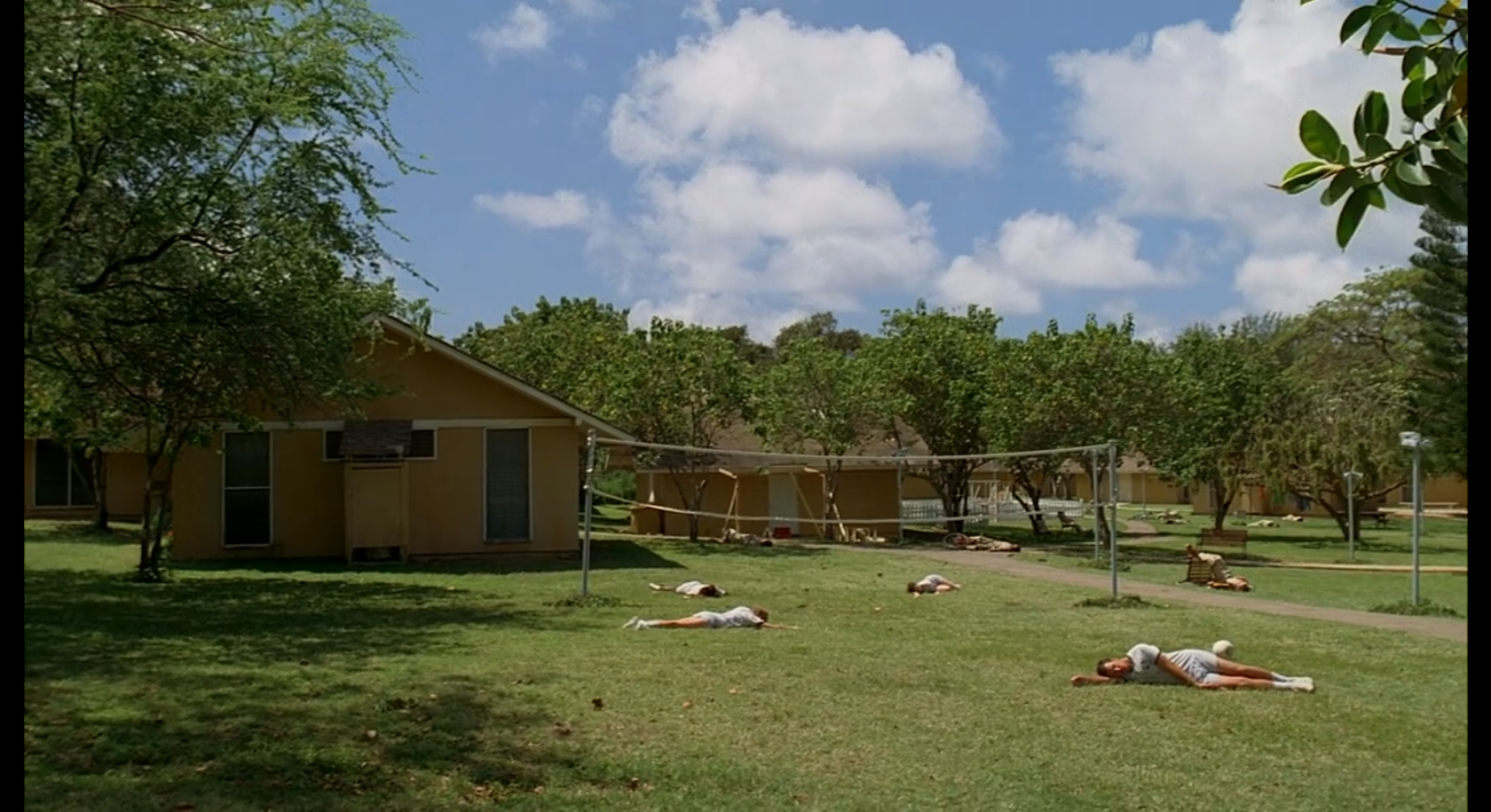
Episode 20: THE MAN BEHIND THE CURTAIN (Ben): Flashbacks have been getting a little stale since there's only so many times we can reveal that con man Sawyer is self-hating and wounded or that Locke is desperate for meaning in a way that often makes him tragically credulous. But the Dharmite Jacobian leader has been an enigma since his first appearance, so this episode—which kicks off with the woodland birth of Ben Linus to parents Roger (played by Uncle Rico Dynamite himself, Jon Gries) and an unnamed mother, who dies in childbirth—promises to be a huge episode, and it is.
Oh God, there is a lot in this one. I'm not going to get to any other ones this time. Pretty much every scene needs unpacking, and introduces dozens of questions, most of which won't be answered for years of production time. Let's give it the old chronological treatment, eh?
Ben's father was helped in the aforementioned childbirth emergency by a chance (or "chance") Dharma-affiliated passerby named Horace Goodspeed, and before you know it, baby Ben has grown to a Harry Potter-coded tween and has been brought (along with papa Roger) to the island. Horace has found Roger a job, and in the brief glimpses we get of the surly and dim-minded Roger, we get the impression that he's doing Roger a pretty big favor by making the offer. Ben, who is a withdrawn and watchful boy, makes friends with a fellow youngster named Annie, and the relationship will be referenced throughout the episode via a pair of crudely carved totems of the two of them that young Annie makes young Ben for a birthday present—the Annie totem in particular is shown, Rosebud-style, as a sign of Ben's lost innocence.
Life on the island isn't great for young Ben. His dad is, to use the technical term, a real miserable piece of shit. Bitter at his lot in life (he's a mere custodian, who, we recognize from his coveralls nametag, is the "Roger Work Man" we've already met in present-day as a skeleton behind the wheel of Hurley's abandoned Dharma van) and seriously alcoholic, he drinks and sneers and openly blames Ben for the death of Ben's mother, which perhaps explains why Ben is such a withdrawn and watchful boy.
Behind emotional (and implied physical) parental abuse, young Ben's got other troubles. School is occasionally interrupted by alerts when Dharma faces incursions and skirmishes from "hostiles"—natives who were already on the island before Dharma got there, and who we recognize as Jacobians. His pet rabbit and Annie are his only friends. His only toys appear to be a couple crudely carved wooden dolls. Also his dead mother is appearing at his window at night.
Oh yeah. Young Ben's being haunted.
Dead Mother draws young Ben out to the sonic fence that holds the hostiles at bay (and which, as we've seen in previous episodes, appears to be able hold the black smoke at bay). Eventually, she draws him out beyond the fence. In the jungle beyond, young Ben meets not-young Richard, or at least a Richard who doesn't look a day younger or older than he will decades later, although he is dressed here as if he's in a touring production of the musical Hair. Young Ben tells not-young Richard that he hates Dharma and wants to join the Hostiles. Not-young Richard, who—probably because he knows more than he's letting on—seems to know more than he's letting on, tells Ben he can maybe join up with them, if he can be very, very patient.
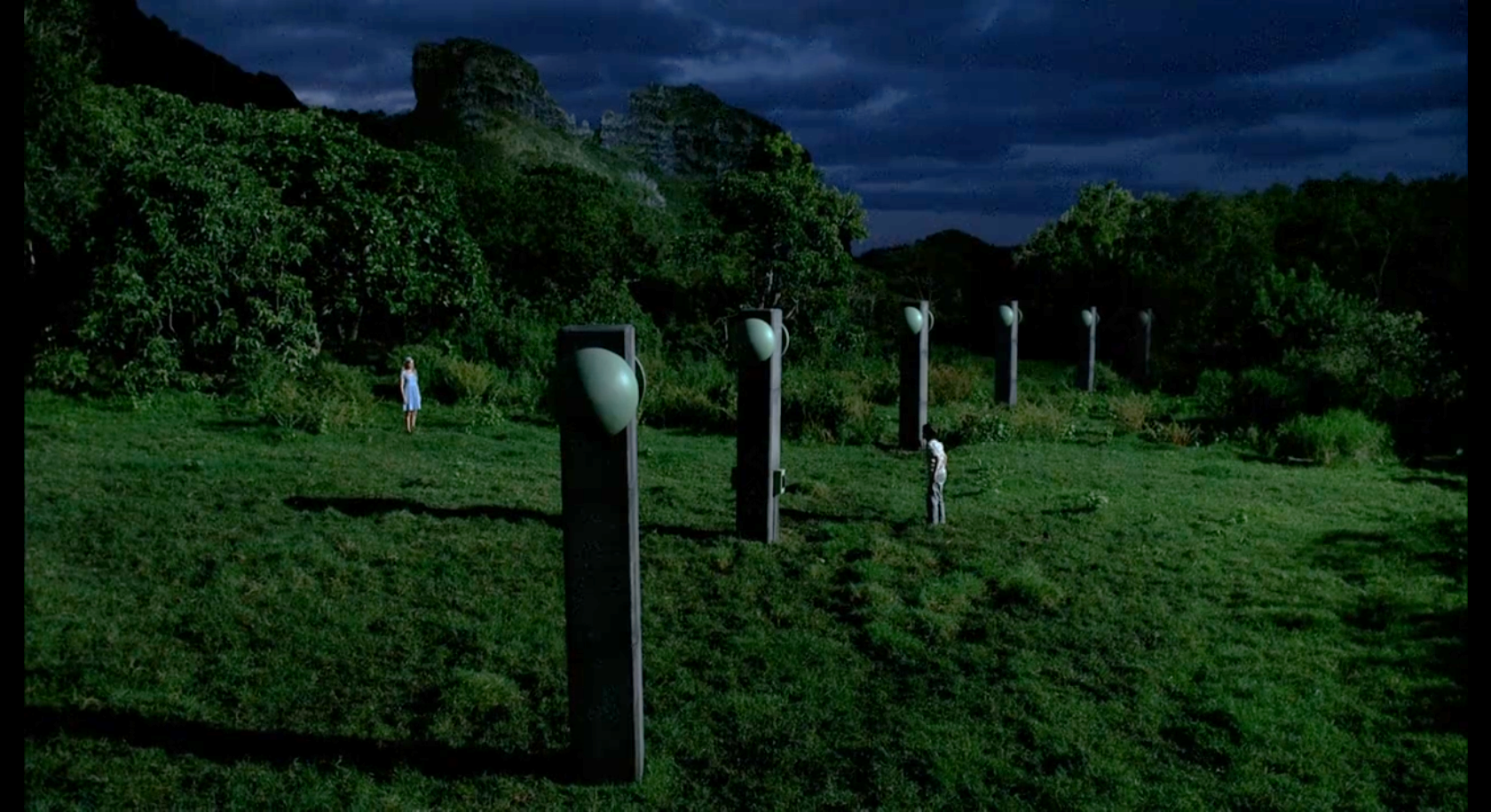
Fast forward an indeterminate amount of time (it's hard to tell, but I think Ben is now supposed to be in his 20s; however, the producers decided to simply put very-clearly-50-year-old Michael Emerson in a hilariously bad wig and ask us not to notice his crows' feet, so ... yeah, I don't know). Less-young Ben is now a Work Man himself, so I guess janitor is a hereditary position in Dharma. He's in his coveralls sharing a Dharma birthday beer with his horrible father in their sweet VW van, which old Roger has parked on the very ridgeline where Hurley finds it so many years later.
Less-young Ben lets his father know how much he's truly hated their time together, and then informs him that putting up with him has, to quote Richard, required him to be very, very patient. With that, less-young Ben puts on a gas mask and uncorks a cannister of some sort of pressurized toxin. Old Roger very quickly dies and is mourned by nobody, even though he could throw a football over a mountain and there's no doubt in my mind that if Coach woulda put him in fourth quarter, we would've been state champions.
Patricide complete, we see less-young Ben return to the Dharma barracks, still in his gas mask. Picking their way through the corpses are members of the hostiles aka Jacobians, also wearing gas masks. Did I forget to mention, forget to mention corpses? They're everywhere, dropped like flies. Seemingly every member of the Dharma initiative has been killed in the exact same way as old Roger. It's all very Jim Jones. How the gas was administered remains a mystery for now, but the mystery of what happened to the Dharma Initiative has at least been solved.
Interlude: In the present day, we have a B-plot which is very soon about to sprout into a cornucopia of A plots. Sawyer returns from giving Locke's dad a fresh killing, with evidence that fertility doctor Juliet (don't worry about her for now) has been conspiring with not-young Ben to abduct all the pregnant and fertile women among the Oceanics (don't worry about that for now either). This makes the Oceanics not trust Juliet at all, but also creates a fair amount of mistrust in their minds for their supposed leader Jack, who has been Juliet's main defender. In their mistrust, the Oceanics hide important things from Jack, like the fact that a lady named Naomi (who came seeking them on an alleged rescue mission) has parachuted onto the island. This subterfuge reaches a point of potential resolution when Jack and Juliet come upon the conspiring Oceanics and it is revealed that 1) Juliet has already told Jack about Ben's plans days ago, and 2) Jack has been devising a plan for what to do about it, which he has not revealed to the rest of them yet, because 3) this is a TV show.
But we were talking about Ben Linus.
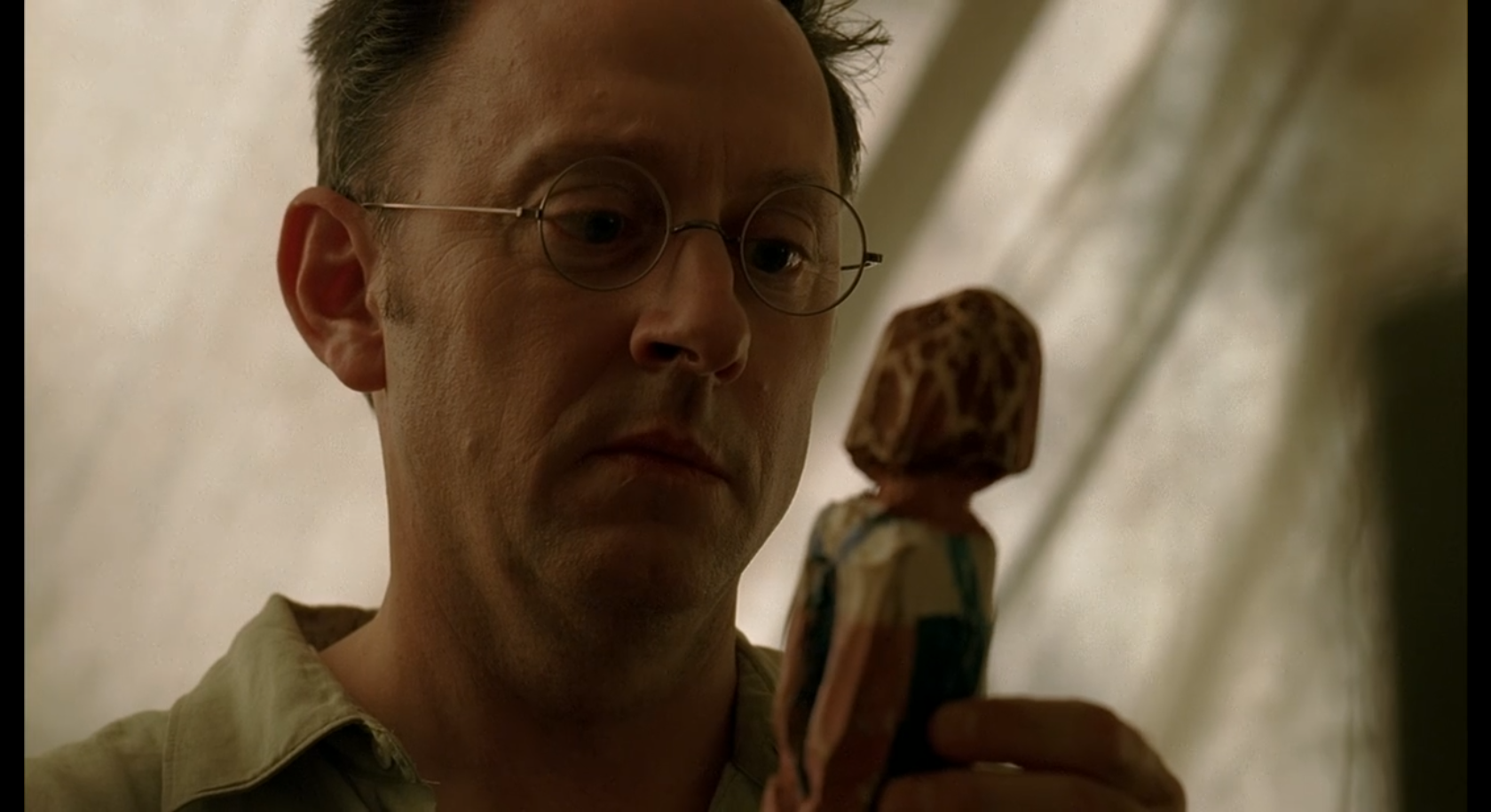
Also in present-day, Locke has returned with his own father's corpse, which has been hand-murdered fresh, courtesy of Sawyer. This means that Locke has passed the test not-young-at-all Ben set him, and Ben now has to make good on his very public promise to reveal to Locke all the mysteries of the island, whose answers are a matter that Ben insists he and only he knows. The main piece of information Ben gives Locke: Ben leads the Jacobians, but Ben answers to a man named Jacob, who only trusts Ben and only ever shows himself to Ben. Locke, who is not unfamiliar with cults, is openly (and reasonably) skeptical about this story; he insists on being brought to Jacob, and Ben, bound by the expectations of followers whose loyalty to him is increasingly uncertain, is unable to refuse, even though refuse is what he very clearly wants to do, mostly because he is lying his ass off about knowing Jacob.
After a bit of plot table-setting (wherein frequently-but-never-yet-permanently-dead Russian tech expert and Jacobian enforcer Mikhail returns to camp with news about the parachutist Naomi's arrival—a warning that is interrupted when Locke beats the teeth out of the Ruskie for causing a distraction), Ben and Locke set off. After plenty of hiking, night falls and the two arrive at a cabin in the jungle, which is surrounded by a ring of ash that is as wide and deep as it is unexplained. Ben, who has been observably anxious about this trip, tells Locke that this cabin is where Jacob is, and that Jacob, while a great man, is not a patient man.
They enter the cabin. It's empty—or seemingly empty, anyway. Ben begins talking to an empty chair, prefiguring Clint Eastwood by a few years. Locke, disgusted with these shenanigans, turns to leave ... and that's when he hears a deep voice call out "Help me ...."
And then everything goes poltergeist shitbananas inside the cabin; objects fly around the room and fall off the walls, a lantern overturns and sends burning oil across the floor, Ben is pushed by an invisible force and flies into a wall, and Locke sees, for just a moment, a mysterious figure in the chair that had been empty.
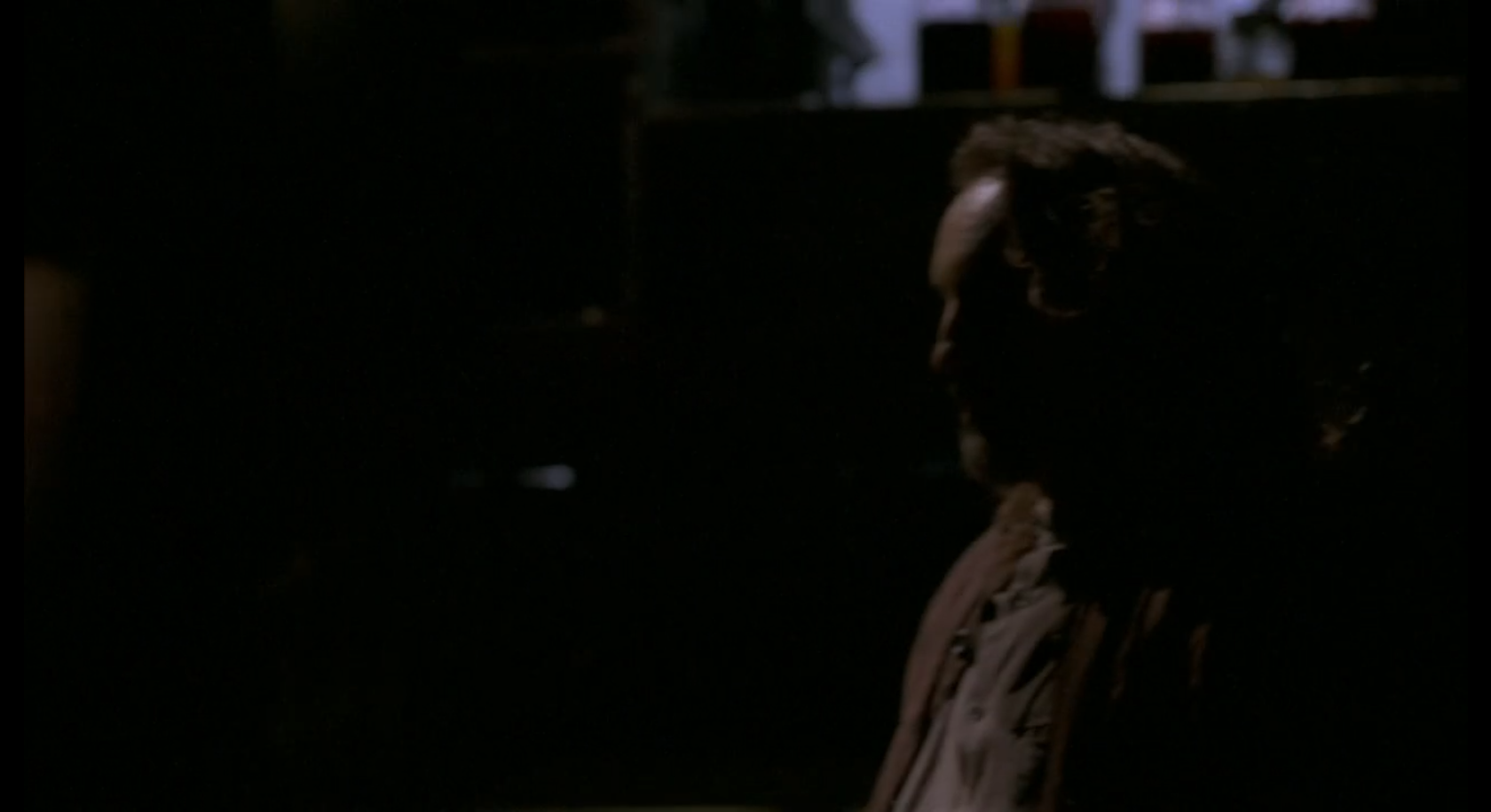
Locke runs out of the cabin. In time Ben follows. "That was Jacob," Ben tells him, thoroughly shaken, if not stirred.
The next morning, Ben takes Locke back to the Jacobian base via another route. When Locke notices this, Ben informs Locke that he wants to show him something, in order to come clean about various lies he's told, like his not having been born on the island. He leads John to a pit; it's a mass grave for the Dharma initiative, now nothing more than skeletons in jumpsuits. Locke looks concerned, though maybe not as concerned as he should be.
"They came here seeking harmony, but they couldn't even coexist with the island's original inhabitants," Ben tells him. "I'm one of the people that was smart enough to make sure I didn't end up in that ditch. Which makes me considerably smarter than you, John."
Locke turns, but too late: Ben Linus shoots Locke and connects lovely to the ribcage, gives him a nice big plot hole right in the abdomen, bestows upon him an exit wound as a parting gift, you get the idea.
"Why did you do this?" Locke gasps.
"Because you heard him," Ben says. "What did he say to you?"
"He said ... 'help me,'" Locke says.
"Well John," Ben sneers at a rapidly failing Locke, "I certainly hope he helps you, John."
Ben leaves. Atop a pile of corpses, John Locke begins to gently die.
End of Episode 20.
The Reframe is a reader-supported publication with a pay-what-you-want subscription structure. Free or paid, everyone gets the same newsletter, because those who can afford it pay. If you would like to support my work, and if you can afford to, consider upgrading to paid.
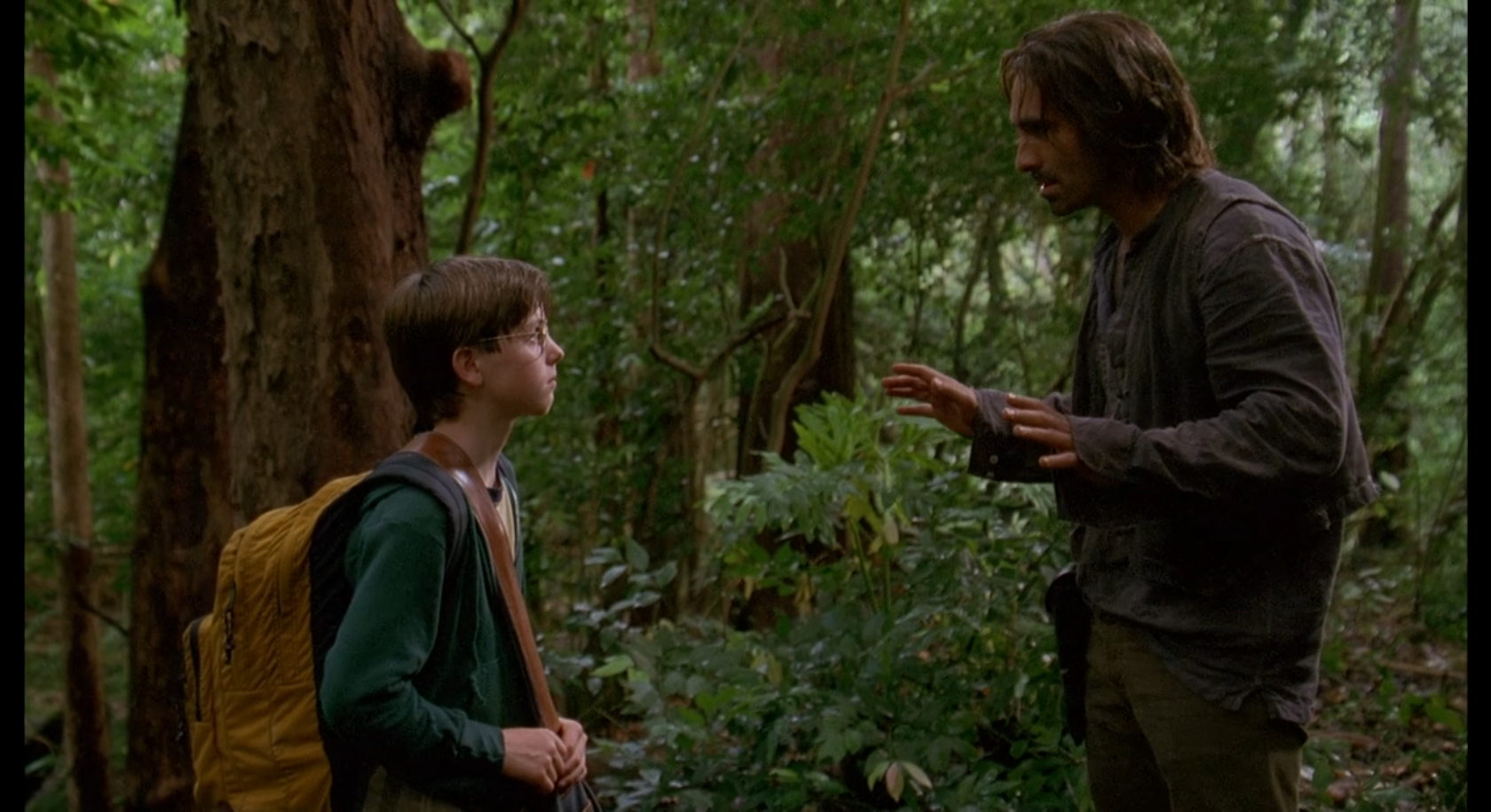
B E L I E F
Time for my beliefs.
1) Mother at the window, I know, I know, it's serious. We know (because I've been telling you) that an appearance of a dead person on the island is almost always The Adversary posing as that person in order to enthrall someone that person knew, and that's certainly the case this time. When it comes to following LOST's plot, the importance of remembering that Ben and Locke and likely many others have both been groomed and enthralled to one degree or another by The Adversary cannot be overstated, and we see the process begin here.
It's strongly suggested that The Adversary has an innate ability to "read" people, and present Itself to those most susceptible. Ben's isolated and unloved, and that makes him very susceptible. The Adversary is here.
But wait. How did The Adversary get just outside Ben's bedroom window, when The Adversary is the black smoke, when we've recently seen that the black smoke is deterred by the sonic fence?
Good question! Hold on a sec.
2) Mother at the fence, I know, I know, it's even more serious. So Dead Mother meets young Ben out by the fence, but warns him against crossing its threshold, which would (I presume) have killed him. Later, we see young Ben has learned to shut down the fence and is using his pet rabbit as a test to ensure that the danger has been removed. How did he figure this out? Well, Ben's a smart and resourceful man, so it stands to reason that he was smart and resourceful as a kid. However, I think we can take many more conversations at the fence or within Dharma territory as a given; Dead Mother is guiding young Ben. (As an aside, it is this pattern, which we'll see repeat itself in future episodes, that helps form my strong belief that this is also what has been happening—unseen by us—to Locke).
So what specifically is The Adversary after? I believe It sees opportunity and is pursuing it.
We will learn that The Adversary's main intention is the destruction of the island, which It believes will also destroy the universe, and thus also will destroy The Adversary's great nemesis, namely, the even more powerful entity I've been calling The Island, whose representative in this reality is Jacob. And we will learn that The Adversary understands this destruction to represent some sort of freedom for Itself, some sort of homegoing. More on what all this represents someday, but for now let's just remember that this is The Adversary's primary goal, and everything it does leads in that direction.
And let's remember that it is and will continue to be strongly implied that The Adversary is a being that can perceive time in ways that allows it to act within time in nonlinear ways, and to see future possibilities. Thus, we should presume it always has many different plans to meet many different contingencies.
Right now Dharma is on the island because, we must presume, Jacob has drawn its members there. However, it is quite likely that the scientific hubris Dharma brought with them represents a great range of possible future realities wherein The Adversary can achieve his goals. Dharma is only months or maybe years away from delving too deeply and too greedily, right into the light at the heart of the Island. If Dharma is successful at this, they will probably destroy the island and thus the universe. This is an incident we've heard called "The Incident," and we'll have a front-row seat to it eventually. I presume The Adversary is grooming certain individuals within Dharma to make The Incident as likely as possible in as many potential future iterations of reality as possible.
But if the Incident possibility fails to come into being (or perhaps I should say for all the iterations of reality in which that possibility fails to manifest), The Adversary will have developed other plans—plans which would involve, among other things, removing the failed experiment that Dharma would then represent.
In other words, if the incident called The Incident doesn't work, The Adversary knows It will eventually need a purge, an event which we will refer to as The Purge.
It is anticipation of this potential or likely future eventuality (or set of future eventualities) that I believe leads The Adversary to groom operatives within Dharma to serve as the mechanism of purging, and chief among these is Ben Linus.
3) "Did she die here on the island?" Not-young Richard says this to young Ben, when young Ben confides that he has come into the Hostiles' jungle seeking his mother, Dead Mother, who is dead.
Some things about Richard we will learn: He has been on the island for a very long time—hundreds or maybe even thousands of years—and doesn't age. He actually is what Ben only pretends to be, which is a person on the island with access to Jacob; a person who Jacob speaks to and trusts with knowledge of his whereabouts. And long ago, Richard (née Ricardus) was groomed by The Adversary to murder Jacob, which The Adversary accomplished in part by posing as Richard's dead wife, so Richard is familiar with The Adversary's ways.
What I want to point out here is that when Richard hears that young Ben has been following his dead mother, he very clearly suspects that what is going on is some Adversarial grooming. Richard might be motivated to protect young Ben from The Adversary, but also probably understands that he has to be cautious with this kid. And, once he suspects this, the question of whether Ben's mother died on the island seems to be important to him. I believe this is an attempt to understand whether young Ben is following The Adversary, or if he is following one of the island's many real ghosts. (Did I mention there are real ghosts, too? Well, there are. The island is a spiritual nexus as well as a cosmic one.)
We will eventually learn that in his role as island protector, Jacob is empowered to impose "rules" upon The Adversary. Not-young Richard's question to young Ben suggests that The Adversary has a restriction on manifesting as anyone who has died on the island itself.
I ask myself if there is anyone who The Adversary has manifested as who died on the island. I can think of two examples in particular, and they are both prominent ones. But these examples happened hundreds or thousands of years ago, and at least one of them occurred when The Adversary was a different person entirely, and so was The Island. No, I'm not going to explain what I mean by that—yet.
What I'll say today is this: Going forward, try to remember that The Adversary may have been given a restriction that It may only manifest as somebody whose physical death transpired off of the island. That's what Richard appears to believe, anyway.
And this fact might eventually become very important to understanding the complexities of The Adversary's present-day plan.
4) "I have been very, very patient." Ben tells his father this, right before killing him. Young Ben is a boy in the mid-to-late seventies. By the time less-young Ben kills his father it must be at least the late 80s if not the 90s, and well over a decade has passed. Why has less-young Ben needed to be so patient?
It's not a question that's ever answered. We must rely upon hints.
I see two likely reasons. First, we will learn that when young Ben and not-young Richard first meet, the Jacobians are being led by a married couple, Charles Widmore and Eloise Hawking, who in present day we know to be island-interested parties of obscure motives and questionable tactics. We will also learn that, due to events we'll cover someday, Hawking will leave the island, leaving Widmore as sole leader of their faction until he is deposed by Ben Linus. And we already know that Widmore is a hard and ruthless man; we'll come to know him as someone who is covetous of the island, someone with a tendency to order his followers to kill others in order to prove their loyalty. We'll also learn that Widmore was deeply skeptical of Ben as a recruit and as a member. So that's reason one: Jacobian politics. I think that Ben had to be patient until he could prove himself in a way that even Widmore couldn't deny. And that thing was betraying his entire community and murdering his father—which might give us context for understanding why Ben would ask Locke to murder his own father, and why his followers would see such a request as justified.
Reason two is that The Adversary may have had other designs for Dharma even after The Incident failed to destroy the island. We know that The Incident resulted in the Swan station and the sequence-entering situation that Desmond was performing when the story began. The sequence was a method of controlled release of energy from The Incident, and the first person stationed to deal with it was the same person who was responsible for it: a man named Stuart Radzinsky, who we have already learned killed himself after long years at the monochrome helm. Radzinksy left behind his partner, Kelvin Inman, who we know understood himself to be a Dharma recruit—which suggests that Dharma was still going when Radzinski died.
My belief is that Radzinsky was to some degree in thrall to The Adversary, who helped inspire what we will eventually see is a single-minded obsession with carrying forward the drilling that will lead to The Incident. When the drilling failed to destroy the island (or perhaps I should say for all the iterations of reality in which that possibility fails to manifest), The Adversary counted on Radzinsky to finish the job by not entering the sequence. We will never know Radzinksy's struggle (unless I am ever hired to write LOST Season 7), but ultimately it must be said that Radzinsky entered the sequence to the very end of his life, and passed the responsibility on to another.
I believe that once the Dharma Initiative proved that it would be a faithful steward of the sequence entering, The Adversary, realizing that they weren't going to help him destroy the universe, no longer had any use for it.
But this all took about fifteen years to play out, during which Ben Linus had to be very, very patient.
5) The purge. Meanwhile we have the question of how everyone was killed in the Dharma purge. This will get a very direct answer, which is that Dharma itself had installed a mass-kill switch on the island, in the form of a poison release system. This will be important next season.
Why would Dharma create a system to insta-poison everyone in their facilities? This question will never be addressed as far as I can tell. We must presume that at some point they determined that their work was far to volatile and important to risk allowing it to fall into hostile hands. Their solution to this threat was, to put it mildly, dumb, but then again, even otherwise smart people are not always good at risk assessment, and people who fear imaginary threats will often create much greater real threats in response.
I would guess the person who had it done was somebody else who was being groomed by The Adversary.
My guess as to who? It won't be answered, and it doesn't really matter, but my guess is the Dharma chief himself, Horace Goodspeed. We'll see more of him in future episodes, so watch along and see if it fits.
6) "This is not a man you go and see. This is a man who summons you." Ben tells Locke this when Locke demands to be brought to Jacob. I think he's basing this notion on two things: first, his own relationship with The Adversary, and second, what he knows of Richard's relationship with Jacob. We will learn that Ben can summon The Adversary, but when this occurs, it will also be implied that doing so crosses an event horizon of some kind. My belief is that in most cases, The Adversary has Ben in more of a "don't call me, I'll call you" sort of situation. We will see hints that this is the way it is between Jacob and Richard as well, so Richard may have said the exact same words about Jacob to Ben that Ben says to Locke, and for the same reason.
7) The ring of ashes. The ashes will show up again in the final season, when Jacobians use them to create a ring around the temple in an attempt to keep The Adversary out. Other Jacobians use their personal stashes of ashes to create personal rings of protection. Ashes, it seems, are believed to hold some sort of binding property against spiritual entities—but i don't think it's just any ashes. A Jacobian will eventually make a point of gathering Jacob's ashes, it's worth noting.
Jacob is not the first person to serve as avatar within reality for The Island's awareness. He's a part of a potentially endless lineage whose membership is only partly known. I'll also point out that it will eventually be strongly, strongly implied that until Jacob, the person who served as avatar for The Island also served as the avatar for the entity I've been calling The Adversary—that it isn't until the arrival of Jacob that these two consciousnesses are split.
But we were talking about ashes.
My belief is that the ashes with these allegedly binding qualities come from the body of a former member of that lineage. The ring around the cabin is big, though, utilizing a lot of ashes—far more than any human body could ever generate. You'd need many former bodies of former island protectors, or maybe one really really big one. How big? We haven't talked about the enormous statue of the enormous Egyptian god Tawaret in a long time, have we? I do wonder what might have inspired ancient island-dwellers to build such a statue. I wonder what The Adversary's original body looked like, and how big it was. I wonder how many ashes such a body would make. Don't know why I brought that up.
Anyway ... I'll also point out that the ashes don't always seem to work, and the ashes around the cabin certainly aren't holding The Adversary captive there, because It has been very active outside of that ring.
So what the hell? Do the ashes work or don't they?
I'll answer the question with another question: Does the sonic fence work, or doesn't it? Depends on what you mean by "works," I'd say. It appears to work to keep out the Jacobian "hostiles." It does not appear to work to keep out The Adversary, even if The Adversary occasionally finds it convenient to allow people to think it does. (Remember that the black smoke seemed at one point to be stopped by the sonic fence, yet Dead Mother was able to appear at will on either side.)
My conclusion from this is that The Adversary finds it advantageous to seem to be constrained when It isn't constrained, and to seem to not be constrained when It is constrained. We might apply this same idea to the ring of ashes.
Those ashes are probably constraining something. But what?
Good question!
8) "Because you heard him." Ben gives this rationale for why he shoots Locke. I think Ben is indeed enraged that Locke heard the whatever-it-is in the cabin.
This tells us a few important things. First, even though Locke heard the voice saying "help me," Ben clearly did not. This means that Ben has never met Jacob or heard Jacob's voice. And this means that Ben probably does believe that the voice Locke heard was Jacob's. Finally, this reveals that Ben is still being very, very patient, and is still being kept on the outside, and has been slowly filling up with a venomous sense of betrayal for having been so long deferred and neglected by the object of his worship.
However, using this as a rationale for shooting Locke is probably bullshit, as is much of what Ben says. I believe that Ben never intended Locke to return from their trip. I believe that since the Oceanic crash, Ben Linus has only one goal as regards John Locke, which is to eliminate him as a threat to his own leadership. Remember, Locke is a prophesied future leader of the Jacobians, and Locke himself is the one—thanks to upcoming time-travel shenanigans—who makes the prophecy.
I believe the plan was to take Locke somewhere by way of eventually leading him back to the Dharma pit and killing him. I think the cabin was a good somewhere for this purpose, because Ben believed it was a likely spot for Locke to have an encounter of some kind. I believe that the cabin is probably somewhere where The Adversary has been active in Its dealings with Ben, because the cabin is a place where It will be active in Its dealings with others. (Horace Goodspeed built the cabin, by the way, since we're keeping our eye on Horace.)
I believe Ben Linus was hoping The Adversary would show up and do all sorts of black-smokeish things to Locke. Then something showed up. But what showed up?
Good question!
9) "Help me." Ben will also eventually confirm Locke's suspicions: In the cabin, he was only pretending to talk to an empty chair. I believe him. He said he was just as surprised as Locke by the manifestation that occurred, and I mostly believe him. And I believe that Ben believed that the manifestation was Jacob, even if I don't believe that it was Jacob.
The question suggests itself: Did The Adversary show up there? Something was in that cabin. But what?
Well, it could be The Adversary, acting in a way unfamiliar to either Locke or Ben, to further Its own agenda. The cabin might be a place where, once upon a time, The Adversary was captured, or allowed some of Its enemies to believe It has been captured. It was manifesting as somebody else, an unknown who we will not see again. That's probably the easiest interpretation. It fits the story all right. Use it if it pleases you.
But I believe something else, so use this instead, if it pleases you better:
It strikes me that there might be something else being held inside that ring of ash. It strikes me that in the near future, Hurley will chance upon the cabin and see both The Adversary and something else inside, so there is some indication that this figure and The Adversary are separate entities. I believe that this encounter was the spirit not of The Adversary or The Island, but of a human from the lineage of humans who have served as physical hosts for the spiritual presence of The Island and/or The Adversary—a spirit who, for whatever reasons, actually is bound within the ring of ashes. Who?
We don't know the whole lineage. Maybe it's meant to be Alvar Hanso, or even The Man In Black—the spirit of the man himself, separate the tactile manifestation that The Adversary uses—which I notice is a manifestation that The Adversary cannot (or anyway does not) use in present-day.
Time being as weird a construct as it is on the island, it could be anyone from past present or future.
It could even be John Locke.
L O S T
Next Time: We're Taking The Hobbit To Die-singard.
The Reframe is totally free, and is supported financially by its readers.
If you liked what you read, and only if you can afford to, please consider becoming a paid sponsor.
Click the buttons for details.
Looking for a tip jar but don't want to subscribe?
Venmo is here and Paypal is here.
A.R. Moxon is the author of The Revisionaries, and the essay collection Very Fine People, which are available in most of the usual places, and some of the unusual places. He is also co-writer of Sugar Maple, a musical fiction podcast from Osiris Media which goes in your ears. He is not Penny's boat.


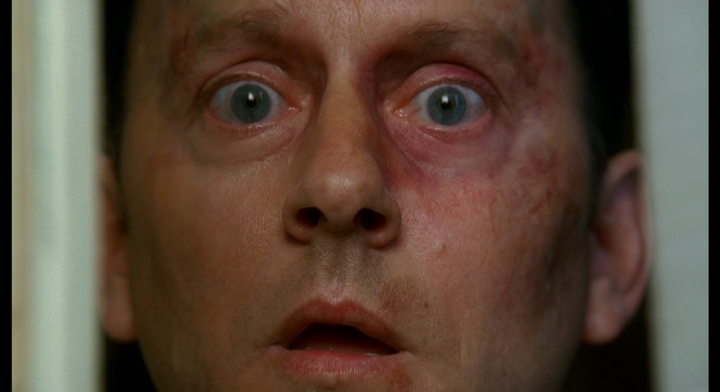
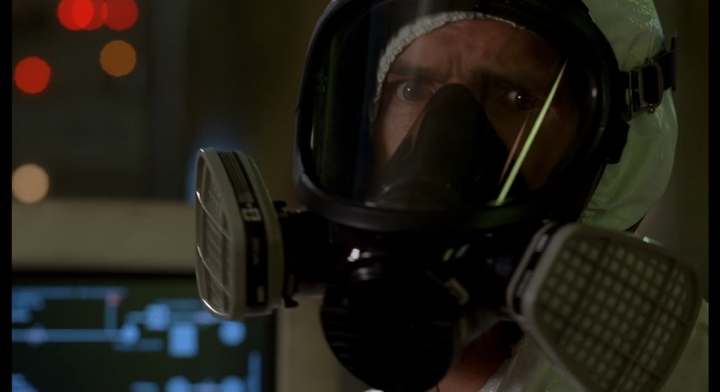
Comments ()